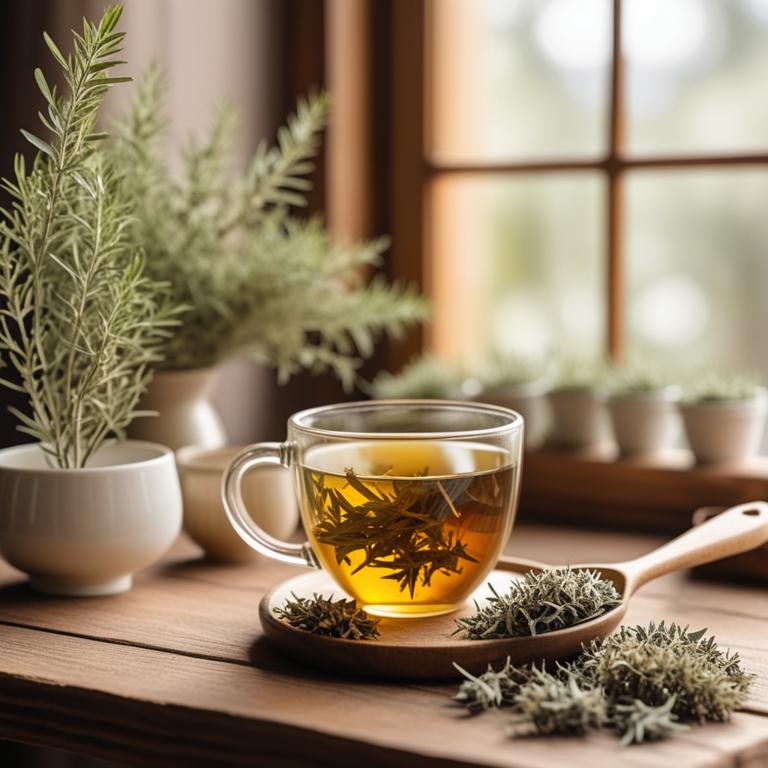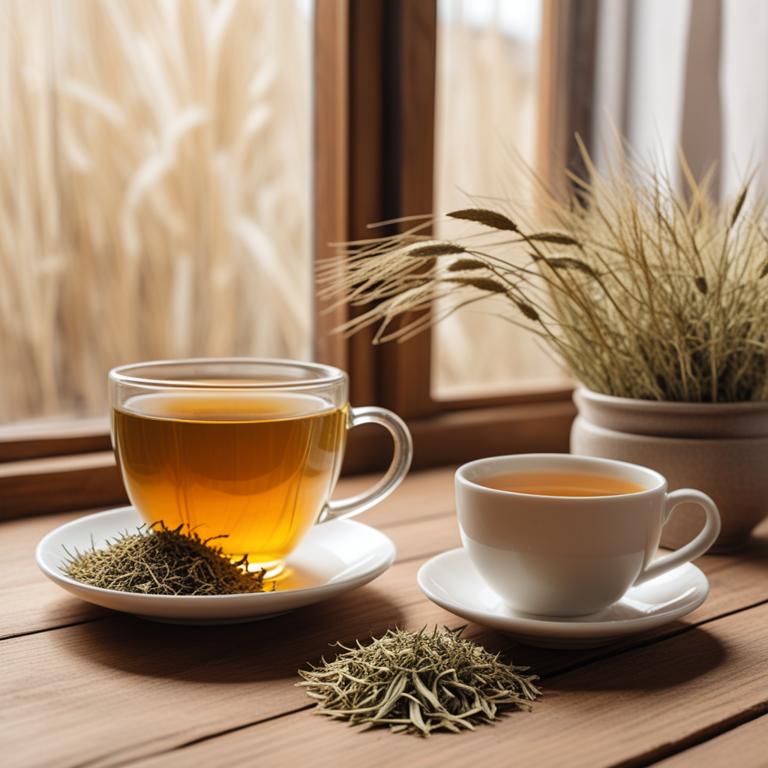8 Herbal Teas For Body Odor

Herbal teas can be a great way to naturally combat body odor.
This is because many herbs have antimicrobial and antifungal properties that help kill bacteria and fungi that cause sweat to smell. For example, Eucalyptus globulus is a natural deodorizer and can help reduce sweat and body odor. It also has anti-inflammatory properties that can soothe the skin.
Another herb that's often used is Rosmarinus officinalis, also known as rosemary, which has antibacterial properties that can help prevent the growth of odor-causing bacteria. Melaleuca alternifolia, also known as tea tree oil, is another herb that's known for its antimicrobial properties and can help kill bacteria and fungi that cause body odor. Drinking herbal teas made with these herbs can help reduce body odor and leave you feeling fresh and confident. They can also have other benefits, such as improving digestion and reducing stress, which can further contribute to a fresher and cleaner body.
By incorporating herbal teas into your daily routine, you can naturally and effectively reduce body odor and improve your overall well-being.
- 1. Eucalyptus globulus
- 2. Rosmarinus officinalis
- 3. Melaleuca alternifolia
- 4. Lavandula angustifolia
- 5. Cymbopogon citratus
- 6. Zingiber officinale
- 7. Thymus vulgaris
- 8. Mentha x piperita
1. Eucalyptus globulus

Eucalyptus globulus teas contains a compound called cineole, also known as eucalyptol, which is a natural antimicrobial agent.
This means it helps to kill bacteria that cause body odor. Eucalyptus globulus teas also contains another compound called limonene, which has antifungal properties, helping to prevent fungal growth that can contribute to body odor. Additionally, eucalyptus globulus teas contains flavonoids and phenolic acids, which have antioxidant properties that help to reduce inflammation and promote healthy skin.
These properties make eucalyptus globulus teas a natural and effective way to combat body odor.
- Gather 2 cups of water, 1 tablespoon of dried Eucalyptus globulus leaves, and a tea strainer or infuser.
- Boil the water in a kettle or pot.
- Add the dried Eucalyptus globulus leaves to the strainer or infuser.
- Steep the Eucalyptus globulus leaves in the boiling water for 5-7 minutes.
- Strain the tea and let it cool before use. You can add it to your bath water or apply it directly to the skin after diluting with water.
2. Rosmarinus officinalis

Rosmarinus officinalis teas contains rosmarinic acid, a key bioactive constituent that helps reduce body odor.
This compound has antimicrobial properties, which inhibit the growth of bacteria that cause sweat to smell bad. Additionally, rosmarinic acid also has antioxidant properties, which help protect the skin from damage caused by free radicals that can contribute to body odor. The anti-inflammatory properties of rosmarinic acid also help soothe and calm the skin, reducing irritation and discomfort that can lead to body odor.
By controlling the growth of bacteria and protecting the skin, Rosmarinus officinalis teas helps prevent body odor and promote a fresher, cleaner feeling.
- Gather 1 cup of boiling water and 1 tablespoon of dried Rosmarinus officinalis leaves.
- Let the Rosmarinus officinalis leaves steep in the boiling water for 5-7 minutes.
- Strain the liquid to remove the leaves and let it cool down.
- Add honey or lemon to taste, if needed, and mix well.
- Drink 1 cup of the tea, 2-3 times a day, to help reduce body odor.
3. Melaleuca alternifolia

Melaleuca alternifolia teas contains a high amount of bioactive compounds, including terpinen-4-ol, cineole, and limonene.
These compounds have antimicrobial properties that help to reduce the amount of bacteria on the skin, which can contribute to body odor. By killing bacteria and preventing their growth, Melaleuca alternifolia teas can help to keep the skin clean and fresh. The antimicrobial properties of the tea's active compounds, particularly terpinen-4-ol, make it effective against a range of microorganisms, including those that cause body odor.
Regular consumption of Melaleuca alternifolia teas may help to keep the body smelling fresh and clean by reducing the growth of bacteria on the skin.
- Gather 1 cup of fresh Melaleuca alternifolia leaves and 2 cups of water.
- Combine the leaves and water in a pot and bring to a boil.
- Reduce heat and let it simmer for 10-15 minutes.
- Strain the mixture and discard the leaves. Let it cool.
- Drink 1/2 cup of the tea 2-3 times a day to help reduce body odor.
4. Lavandula angustifolia

Lavandula angustifolia teas contains the bioactive constituents linalool and linalyl acetate, which are known for their antimicrobial and antifungal properties.
These compounds help reduce the growth of bacteria and fungi that cause body odor, keeping the skin and body smelling fresh and clean. The antiseptic properties of linalool and linalyl acetate also help to kill bacteria that cause sweat to become smelly, reducing the need for deodorants and antiperspirants. Additionally, the tea's antifungal properties help to prevent fungal infections that can cause unpleasant odors.
By consuming Lavandula angustifolia teas, individuals can experience a reduction in body odor due to the tea's ability to control the growth of odor-causing bacteria and fungi.
- Gather 1 cup of fresh Lavandula angustifolia flowers or 2 teaspoons of dried flowers.
- Combine the flowers with 1 cup of boiling water in a heat-resistant cup.
- Steep the mixture for 5-7 minutes. Then, strain the liquid using a fine-mesh sieve.
- Let the tea cool down. You can store it in the fridge for up to 24 hours.
- To use, mix 1/4 cup of the cooled tea with 1 cup of water as a final rinse after showering or bathing.
5. Cymbopogon citratus

Cymbopogon citratus teas contains a high concentration of limonene and geraniol, two potent essential oils.
These oils have antiseptic and antibacterial properties, which help to combat bacteria that cause body odor. The tea's active constituents, including citral and beta-pinene, work together to reduce sweat's acidity and eliminate bacteria growth. By controlling the bacteria that break down sweat into odor-causing compounds, Cymbopogon citratus tea helps to minimize body odor.
Additionally, its deodorizing properties make it an effective natural remedy for maintaining a fresh and clean body scent.
- Gather ingredients: 1 cup of fresh Cymbopogon citratus leaves or 2 tablespoons of dried leaves.
- Wash the fresh leaves or dry them in a low-temperature oven (150°F) for 10-15 minutes to kill bacteria.
- Combine 1 cup of boiling water with the leaves in a tea infuser or a heat-resistant cup.
- Steep the mixture for 5-7 minutes, then strain the tea into another cup.
- Drink 1 cup of the tea, 1-2 times a day, after showering or when you feel body odor.
6. Zingiber officinale

Zingiber officinale teas contains a compound called zingiberene, a sesquiterpene that has antimicrobial properties.
These properties help to reduce the growth of odor-causing bacteria on the skin. The tea also contains gingerols, specifically gingerol and shogaol, which have anti-inflammatory and antiseptic effects that help to control sweat and reduce body odor. Additionally, the tea contains vitamin C, which helps to improve blood circulation and reduce sweat production.
By reducing the growth of bacteria and controlling sweat, Zingiber officinale teas can help to alleviate body odor.
- Gather 1 teaspoon of dried Zingiber officinale root, 1 cup of boiling water, and a cup.
- Add the 1 teaspoon of dried Zingiber officinale root to the cup.
- Pour the boiling water over the root in the cup.
- Let it steep for 5-7 minutes, then strain the liquid.
- Drink the tea, ideally 2-3 times a day, to help with body odor.
Zingiber Officinale Tea on Amazon
FGO Organic Ginger Tea, 100 Count, Eco-Conscious Tea Bags, Caffeine Free, Packaging May Vary (Pack of 1)
Disclaimer: We earn a commission if you click this link and make a purchase at no additional cost to you.
7. Thymus vulgaris

Thymus vulgaris teas contains thymol, a potent bioactive constituent that is known for its deodorizing properties.
Thymol helps to reduce bacteria on the skin, which are often responsible for body odor. Thymus vulgaris teas also contains carvacrol, another key compound that has antimicrobial and antifungal properties, further helping to combat odor-causing bacteria. The antimicrobial properties of thymol and carvacrol help to break down sweat and eliminate the bacteria that thrive in it, reducing body odor.
By reducing the growth of bacteria on the skin, Thymus vulgaris teas can help to keep you feeling fresher and more confident.
- Gather 1 cup of fresh Thymus vulgaris leaves, 1 cup of boiling water, and a heat-resistant cup.
- Add 2 tablespoons of fresh Thymus vulgaris leaves to the heat-resistant cup.
- Pour the boiling water over the Thymus vulgaris leaves.
- Let the mixture steep for 5-7 minutes, then strain it into another cup.
- Drink the tea 2-3 times a day to help reduce body odor.
8. Mentha x piperita

Mentha x piperita teas contains compounds like limonene, beta-pinene, and menthol, which have antiseptic and antibacterial properties.
These properties help reduce the growth of bacteria that cause body odor. The tea's high menthol content also helps to kill bacteria and fungi on the skin, reducing sweat's ability to become a food source for odor-causing microorganisms. Additionally, menthol's cooling effect can help to dry the skin, reducing the moisture that bacteria need to thrive.
By killing bacteria and reducing moisture, Mentha x piperita tea can help to minimize body odor.
- Gather 1 cup of fresh mint leaves (Mentha x piperita) and 1 cup of boiling water.
- Steep the mint leaves in the boiling water for 5-7 minutes.
- Strain the mixture into a cup and discard the leaves.
- Add 1 tablespoon of honey (optional) to the tea and stir well.
- Drink the tea 2-3 times a day to help reduce body odor.